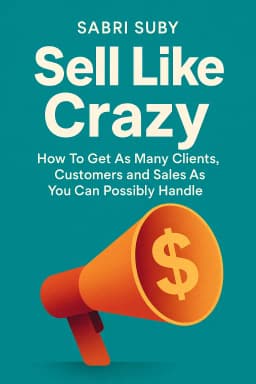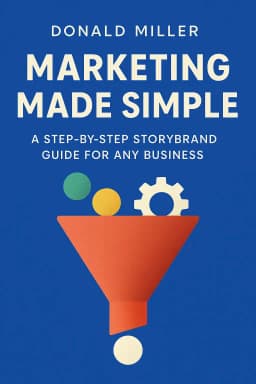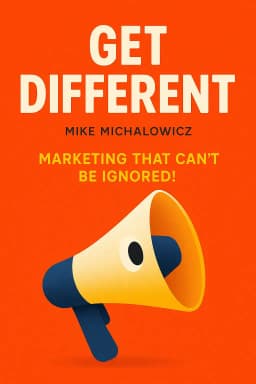
Sell the Fortune, Not the Cookie
The 20 Keys to a Great Brand Story and Why Your Business Needs One
Golden Hook & Introduction
SECTION
Olivia: I'm going to make a bold claim: The best product doesn't win. In fact, the company with the most features, the biggest budget, and the most famous name is often the one that ends up in the history books for all the wrong reasons. Jackson: Hold on, that sounds like something you'd say to make a startup with no money feel better about itself. "Don't worry, your product is terrible, but your story is amazing!" Come on, surely the better product has the edge? Olivia: You'd think so, but it's often not the case. It's the core idea behind a fantastic book, "The Fortune Cookie Principle" by Bernadette Jiwa. And the concept is so powerful because it taps into something ancient about us. Jackson: The Fortune Cookie Principle? Okay, I'm intrigued. Is it about vague, uplifting predictions for your business? "You will soon meet a tall, handsome investor." Olivia: (Laughs) Not quite. But it's no surprise the author focuses so much on story. Bernadette Jiwa grew up in Ireland in a home that was apparently rich with oral storytelling, even if it was short on books. And she argues that this ancient human need for narrative is the most overlooked asset in modern business. The principle is simple: every business sells two things. The cookie, and the fortune. Jackson: The cookie and the fortune. Okay, I think I see where this is going. The cookie is the thing itself—the product, the service. The fortune is... the little piece of paper inside? The idea? Olivia: Exactly. The cookie is the commodity. It's the car, the coffee, the software. It's tangible. But the fortune... that's the intangible. It's the story, the meaning, the feeling, the values. And Jiwa's argument is that we've become obsessed with perfecting our cookies, while the real value, the real differentiator, is in the fortune.
The 'Fortune' vs. The 'Cookie': Why Your Story is More Valuable Than Your Product
SECTION
Jackson: That’s a great way to put it. We're all focused on the recipe, the ingredients, the perfect bake... but we forget the little slip of paper is what people actually talk about and remember. But can a great 'fortune' really save a mediocre 'cookie'? Olivia: Well, let's look at it from the other side. A great cookie couldn't save a company that forgot its fortune. Think about Kodak. For generations, they weren't just selling film and cameras. They were selling "Kodak moments." Their brand was synonymous with capturing memories. They had the best cookie on the market, a global brand, immense trust. Jackson: I remember that. The name itself meant photography. My parents had a Kodak camera. It was a fixture. Olivia: It was! But then, a new story began to unfold: digital photography. And here’s the killer detail: Kodak's own engineers invented the first digital camera back in 1975. They literally held the future in their hands. Jackson: Wait, they invented it? So they had the next-generation cookie before anyone else. What happened? Olivia: They buried it. They were so terrified that digital would cannibalize their lucrative film business—their golden cookie—that they hid the future in a closet. They failed to tell themselves, and the world, a new story. They thought they were in the chemical and paper business, but they were really in the memory-sharing business. While they were protecting their old cookie, competitors like Sony and Canon were selling a new fortune: instant, shareable, infinite memories. Jackson: Wow. So they invented their own executioner and kept it locked in the basement. That's a failure of story. They failed to imagine a new future for themselves. Okay, so that's a legacy brand that failed. What about a brand that started with almost no cookie, just a fortune? Olivia: Perfect question. Let's talk about Instagram. In 2010, a tiny team of four people launched a free app into a crowded market. Their "cookie" was just lines of code. It didn't cost anything. But the "fortune" they offered was immense. Jackson: What was it? Olivia: It was the feeling of being a great artist. With a single tap, you could transform a mundane photo of your lunch into a moody, beautiful, shareable piece of art. The fortune was, "You are a creative person. You have a good eye. You can connect with people through beauty." That story was so powerful that just two years later, with only a handful of employees, Facebook bought them for a billion dollars. Jackson: A billion dollars for a free app. That’s insane. So the 'fortune'—the story of creativity and connection—was worth a billion dollars. The product was free. That flips the entire business model on its head. Olivia: It absolutely does. It proves that the story you enable people to tell about themselves is often more valuable than the product you sell. And you know, it's interesting, the book is highly rated, but a common critique I saw from some readers is that the ideas feel almost too simple. Jackson: I can see that. "Tell a good story." It sounds a bit like a platitude. Olivia: Right, but hearing those two examples back-to-back, it's not simple, it's just... fundamental. Kodak had a billion-dollar cookie and lost. Instagram had a billion-dollar fortune and won. The simplicity is the point. We overcomplicate business with features and specs, when we should be focusing on the fundamental human desire for meaning.
Building a 'Close-to-Heart' Brand: The Blueprint for Creating Meaning
SECTION
Jackson: That makes sense. It’s not about a marketing slogan, it’s about the core reason for existing. So if we accept this, how do you actually do it? How do you build a brand that's more fortune than cookie? Olivia: Well, that's the second half of the book. Jiwa argues that the goal is to move your brand from being merely "top-of-mind"—which is what old-school advertising was all about—to being "close-to-heart." A close-to-heart brand is one that people don't just use, but love. And it starts with your actions, not your ads. Jackson: Actions speak louder than words. Another simple truth. Olivia: But one that's so rarely practiced with integrity. A perfect example is the non-profit, charity: water. Its founder, Scott Harrison, was a former nightclub promoter who had a crisis of conscience and wanted to do something meaningful. He decided to tackle the global water crisis. Jackson: A noble goal, but one that a lot of people are skeptical about. The big question with charities is always: where does my money actually go? Olivia: Exactly. Harrison knew that was the biggest barrier to trust. So he didn't just tell a story about transparency; he built the organization's entire structure as a story of transparency. He created two separate bank accounts. One account, funded by private donors and sponsors, covers all operational costs—salaries, rent, paperclips. The other account is for public donations. Jackson: Let me guess. One hundred percent of public donations go directly to the water projects? Olivia: One hundred percent. And they prove it. They use GPS coordinates and photos to show donors the exact well their money helped build. The story isn't a promise on a website; it's baked into the accounting. The 'fortune' they are selling isn't just clean water; it's the feeling of absolute certainty that you made a difference. It's trust. Jackson: That's not just a story, that's a system. The fortune is embedded in the process. That's brilliant. But that's a non-profit. How does a for-profit company build that kind of 'close-to-heart' feeling without just giving everything away? Olivia: By taking a stand. By having values that are more than just words on a poster in the breakroom. The ultimate example of this is Patagonia. On Black Friday, the single biggest day of consumerism in America, they took out a full-page ad in The New York Times. Jackson: Advertising a huge sale, I assume? Olivia: The ad featured a picture of their best-selling fleece jacket. The headline read: "Don't Buy This Jacket." Jackson: (Laughs) Come on. That's gutsy. Olivia: It was. The ad copy went on to detail the environmental cost of producing that jacket—the water used, the carbon emitted, the waste created. It encouraged people to think twice, to repair their old gear, to consume less. It was a direct contradiction of what a retailer is supposed to do. Jackson: And I bet it made people want to buy from them even more. Olivia: Of course! Because the story they were telling wasn't, "Our jackets are warm and durable." That's the cookie. The fortune was, "We are a company that cares about the planet more than we care about your money." It instantly created a tribe. You don't just buy a Patagonia jacket; you buy a membership card to a community of people who believe in responsible consumption. That's a 'close-to-heart' brand.
Synthesis & Takeaways
SECTION
Olivia: So, whether it's Kodak's fear of the future, Instagram's vision of creativity, charity: water's radical transparency, or Patagonia's rebellion against consumerism, the pattern is the same. The 'cookie'—the product, the service, the physical thing—is just the ticket to the show. Jackson: And the 'fortune' is the show itself. It's the feeling, the meaning, the connection. It's what the brand allows the customer to say about themselves. 'I'm a creative photographer.' 'I'm a responsible donor.' 'I'm an environmentalist.' The brand becomes a piece of their identity. Olivia: Exactly. The product is the artifact, but the story is the legacy. And in the 21st century, that's the only real estate worth owning. It's not about being top-of-mind; it's about being close-to-heart. Jackson: That really reframes everything. It’s not about marketing to people, it’s about creating something that people want to make a part of their own story. Olivia: So the question for anyone listening—whether you're running a business or just building your personal brand—is simple: What's your cookie, and what's your fortune? What's the thing you sell, and what's the story people are really buying? Jackson: That's a powerful question to sit with. We'd love to hear your examples. What's a brand you love not for the product, but for the story? Let us know on our socials, we're always curious to see what resonates with you all. Olivia: This is Aibrary, signing off.









